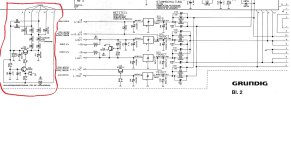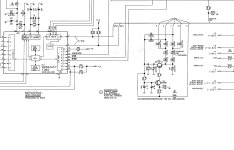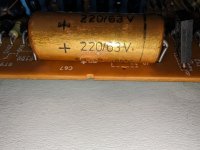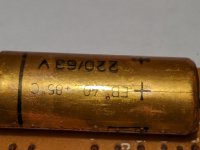Why don´t you try to traslate to english, the text written under the circuit "Minusspannungzerzeugung für die anzeigerøhre"? 😉
It creates a negative rail on top of the AC for the VFD display.
It creates a negative rail on top of the AC for the VFD display.
🤣 🤣 🤣Wow thats the longest word I ever seen! But why use such a high end German capacitor? These ROE are expensive. There is cheaper brands on the board.
ROE (Roederstein) was pretty standard back then. Look inside a B&O product from 70-80..... It is filled with these.
Steady supply, easily available and not expensive at the time.
Nowadays they some have claimed "superior sound quality" resulting in some hype, and prices raising to rediculous for 40 years old
NOS capacitors. Unfortunately not all of ROE´s live up to that. The small radial RED EK ones dried out and showed sometimes less than
10 years lifespan. They cracked and dried out. Not worth the trouble contrary to the hype.
The orange ones shown in your pictures strangely enough seem to have an everlasting lifespan.
Somewhere in my "mess" I have some bags of 470µF/40volt, from back when Gryphon considered them
good enough for their products 😉
And BTW...... The germans invented an even longer word:...." Schlimmerverbesserung".
Freely translated: A solution, that makes the problem even worse, than it was to begin with 🤣 🤣 🤣
Last edited:
Surely you can use the Google better to find even longer words in German, some of which are actually in use (many will be fictive, though).
Roederstein capacitors are no 'high end' capacitors, that's just hype.
About 25-30 years ago, the local electronics parts store carried Philips and Roederstein electrolytics. They were comparable in price and quality.
Philips has been forgotten and Roederstein, apparently, has gained a reputation.
I think few people realise that most of the Philips line lives on to this day as Vishay. Philips sold the division to Beyerschlag Components (BC) which was acquired by Vishay. Many of the Vishay type designators find their origins in the Philips era.
Roederstein capacitors are no 'high end' capacitors, that's just hype.
About 25-30 years ago, the local electronics parts store carried Philips and Roederstein electrolytics. They were comparable in price and quality.
Philips has been forgotten and Roederstein, apparently, has gained a reputation.
I think few people realise that most of the Philips line lives on to this day as Vishay. Philips sold the division to Beyerschlag Components (BC) which was acquired by Vishay. Many of the Vishay type designators find their origins in the Philips era.
Last edited:
The history on Beyschlag (not Beyerschlag) and Philips is a bit different from what I thought. This is the snippet I found on the Vishay site:
It explains the Philips origin of many Vishay electrolytics model designators as they carried over through BC.
Vishay Beyschlag
A look back into the history of the company shows a solid business based on natural growth. From the moment the company was founded in 1931, the customer has always come first. At their location in Berlin, Germany, the company first started producing rectifiers to meet the growing need of the radio industry. Soon to follow, carbon film resistors were in production.
In 1974, the company relocated to Heide, Germany. A part of Philips Components until 1999, Philips divested the passive components business to allow the formation of BCComponents. Vishay acquired BCComponents in 2002.
It explains the Philips origin of many Vishay electrolytics model designators as they carried over through BC.
Vishay is very high quality! I have seen resistors, capacitors and they all expensive lol
I will refrain from googling long German words 😆
I will refrain from googling long German words 😆
"...the customer has always come first..."
That era has gone.
& thanks Boydk for your post #4.
Those red cylinders were used in 555 timer circuits in the 80's, for womans hair curling appliances 'not to keep powered up for to long'.
As if midieval witchcraft took a sudden twentieth century u-turn. It seems still in fashion our days though...
Back to our german long words lesson.... Minusspannungserzeugung.
Notice the 's' ! (Negative voltage generation).
That era has gone.
& thanks Boydk for your post #4.
Those red cylinders were used in 555 timer circuits in the 80's, for womans hair curling appliances 'not to keep powered up for to long'.
As if midieval witchcraft took a sudden twentieth century u-turn. It seems still in fashion our days though...
Back to our german long words lesson.... Minusspannungserzeugung.
Notice the 's' ! (Negative voltage generation).
"...the customer has always come first..."
That era has gone.
& thanks Boydk for your post #4.
Those red cylinders were used in 555 timer circuits in the 80's, for womans hair curling appliances 'not to keep powered up for to long'.
As if midieval witchcraft took a sudden twentieth century u-turn. It seems still in fashion our days though...
Back to our german long words lesson.... Minusspannungserzeugung.
Notice the 's' ! (Negative voltage generation).
- Home
- Amplifiers
- Power Supplies
- Grundig PSU what is it doing?



